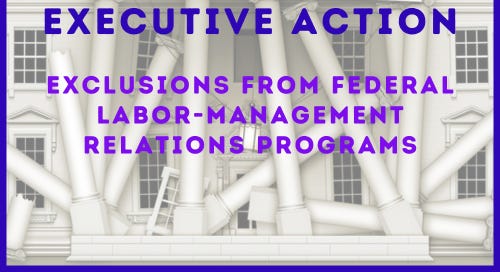Overview:
This executive order excludes dozens of federal agencies and subdivisions from labor-management relations programs under the guise of national security. Issued on March 27, 2025, it removes collective bargaining rights from large segments of the federal workforce, particularly in departments like State, Defense, Treasury, and Veterans Affairs. The administration claims the exclusions are necessary for national security. Critics see it as a sweeping and unjustified attack on federal unions and worker rights.
Detailed Analysis:
Expansion of National Security-Based Exclusions:
Policy:
Amends Executive Order 12171 to designate additional agencies and subdivisions as excluded from Chapter 71 of Title 5, United States Code, citing national security exemptions.
Progressive Concern:
Massive Overreach:
The order adds broad parts of multiple agencies not traditionally considered national security-focused, stripping rights from thousands of workers.Thin Justification:
The definition of "national security" is stretched beyond reason, including areas unrelated to intelligence or defense.Undermining Labor Protections:
Employees lose their ability to collectively bargain over workplace safety, staffing, and other basic conditions.Targeting of Specific Agencies and Functions:
Policy:
Named exclusions include personnel in the Departments of Justice, Homeland Security, Treasury, Energy, and Veterans Affairs, as well as certain offices within State, Defense, and the FBI.
Progressive Concern:
Union-Busting Tactic:
Many affected employees are union members. The order weakens unions by removing whole units from their protection.Loss of Voice:
Affected employees can no longer collectively raise concerns through formal labor-management processes.Morale and Retention Risks:
Stripping workplace rights may increase attrition in already strained federal agencies.Precedent for Future Rollbacks:
Policy:
Uses the national security rationale as a basis for future exclusions and potential reinterpretations of worker protections in other areas.
Progressive Concern:
Dangerous Precedent:
Opens the door for future administrations to hollow out collective bargaining across the federal government.Backdoor Deregulation:
Without union oversight, agencies may scale back workplace standards and protections unchecked.Authoritarian Governance Trend:
Concentrates executive power while diminishing mechanisms for employee input and institutional accountability.
Historical Context:
Past Attacks on Federal Unions:
Trump’s 2018 executive orders attempted similar rollbacks of union rights but were partially blocked in court. This order revives and expands those efforts.Chapter 71 Protections:
The Federal Service Labor-Management Relations Statute, passed in 1978, was designed to ensure collaborative labor relations across federal agencies. This order significantly undermines that intent.Weaponizing National Security:
Historically, national security exclusions have been narrow and specific. This sweeping reinterpretation is unprecedented.
Broader Implications:
Federal Workforce Instability:
Weakening labor rights can reduce morale and effectiveness, especially in mission-critical agencies.Weakened Accountability:
Unions play a key role in flagging issues like discrimination, mismanagement, and safety risks. Silencing them has consequences.Ripple Effects on State and Local Labor Policy:
Federal rollbacks often embolden similar actions at the state and municipal level, spreading anti-union policy nationwide.
Social Media Posts:
Post 1:
Trump just gutted labor rights for huge swaths of federal workers—claiming "national security." It's union-busting, plain and simple. Read more: https://www.whitehouse.gov/presidential-actions/2025/03/exclusions-from-federal-labor-management-relations-programs/ #ProtectFederalWorkers #UnionRights
Post 2:
This executive order rips away bargaining rights from employees across DOJ, VA, DHS, and more. No hearings. No debate. Just authoritarian policy by fiat.
#StopThePowerGrab #LaborRightsMatter
Post 3:
Stripping federal workers of collective bargaining rights won’t make America safer. But it will make government less fair, less effective, and more afraid.
#UnionStrong #DefendWorkerVoice



